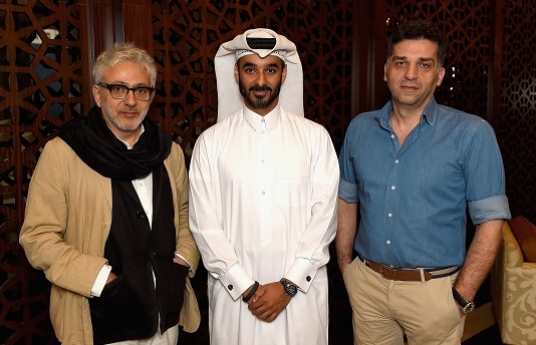Qumra opens in Doha with bespoke mentorship labs and meetings to nurture regional film talent
Mar 06, 2015

Short films in ‘New Voices in Cinema’ to be screened on Saturday at Opera House, Katara Village at 7.30 PM
Audiences can watch Doha Film Institute supported projects in collection of short films – Old Airport Road by Qatari director Abdullah Al-Mulla, The Forgotten, Maqloubeh, Survival Visa and The Wall
Doha, Qatar – 6 March, 2015: The inaugural edition of Qumra, a new event by the Doha Film Institute, opened on Friday (March 6, 2015), with more than 100 leading film industry professionals coming together for a series of bespoke mentorship labs, master classes, meetings and film screenings, to nurture regional talent.
Welcoming the delegates and marking the opening celebration of Qumra, Fatma Al Remaihi, CEO of the Doha Film Institute, said: “With Qumra, we mark the beginning of new collaborations and creative partnerships. Qumra is about exchange of ideas, knowledge and inspiration. It provides a supportive and productive space to catalyse the works of new talents who will benefit from the experience and insights of the masters. We are delighted to have some of the world’s leading film industry professionals in Doha, who will open doors to a new understanding of cinema for the participants.”
She added: “Qumra also allows our audiences in Doha the opportunity to experience films by leading names in world cinema as well as exciting new voices in the industry that have been supported through the Institute’s funding initiatives. At our industry programme, emerging filmmakers from Qatar and the MENA region will be connected with industry professionals in a series of creative workshops and development labs to support their projects in progressing to the next stage .”
On the opening night, a screening of An Episode in the Life of an Iron Picker was held, which was attended by its director Danis Tanovic, who won the Academy Award and Golden Globe for his first feature-length film No Man’s Land. Tanovic took part in Q&A session with the audience following the screening. He is also one of the Qumra Masters, who will lead a Master Class at the event and participate in individual mentoring sessions with local and regional filmmakers.
The Qumra public screenings will also be attended by their directors, which provides emerging professionals and the public to engage in discussions with them on their creative process.
The opening celebration was attended by Abdulla Al Mosallem, Chief Administrative Officer of the Doha Film Institute, Elia Suleiman, the Artistic Director, who worked closely in developing the concept of Qumra, and Qumra Master Class moderator Richard Pena, the former programme director of the Film Society of Lincoln Center and a Professor of Professional Practice at the School of Arts at Columbia University.
Being held from March 6-11, Qumra will mentor 29 projects in various stages of production to take them to the next stage. Representatives from leading international film festivals, funding bodies, sales, production and distribution companies along with development specialists and script consultants are part of the delegates.
The public screenings feature films by the Qumra Masters – Gael García Bernal, Leila Hatami, Cristian Mungiu, Abderrahmane Sissako and Danis Tanović – alongside new voices in cinema selected from films supported by the Institute’s grants and co-financing programmes.
Today (Saturday, March 7, 2015), from 7.30 to 9 PM at Opera House in Katara Village, Qumra will host the public screenings of five short films that are part of the ‘New Voices in Cinema.’
These include: The Forgotten (Syria/Qatar, 2012), directed by Ehab Tarabieh, about a man who seeks to return to Golan Heights, his home, with the help of a smuggler. However, his journey is confounded by the onset of dementia. Maqloubeh (Palestine, France, Egypt, Qatar; 2012) by Nicolas Damuni, is about five young men who make their own version of the traditional Palestinian meal but when they sit down to eat they are rudely interrupted.
Qatari film director Abdullah Al-Mulla’s Old Airport Road (Qatar, 2014) is about a delusional and aimless man who wanders the city lost in imagination. Over the course of the day, his monologue provides an unintentionally sarcastic expose of the reality of being disconnected from family and friends.
Survival Visa (Tunisia, Qatar; 2014), directed by Nadia Rais, imagines a world in which paranoia begets a grotesque and drastic solution to an imagined threat, and The Wall (Lebanon, Qatar; 2012) by Odette Makhlouf Mouarkech, is an amusing portrait of a group of young people who become sort of a family creating intense camaraderie out of disaster.